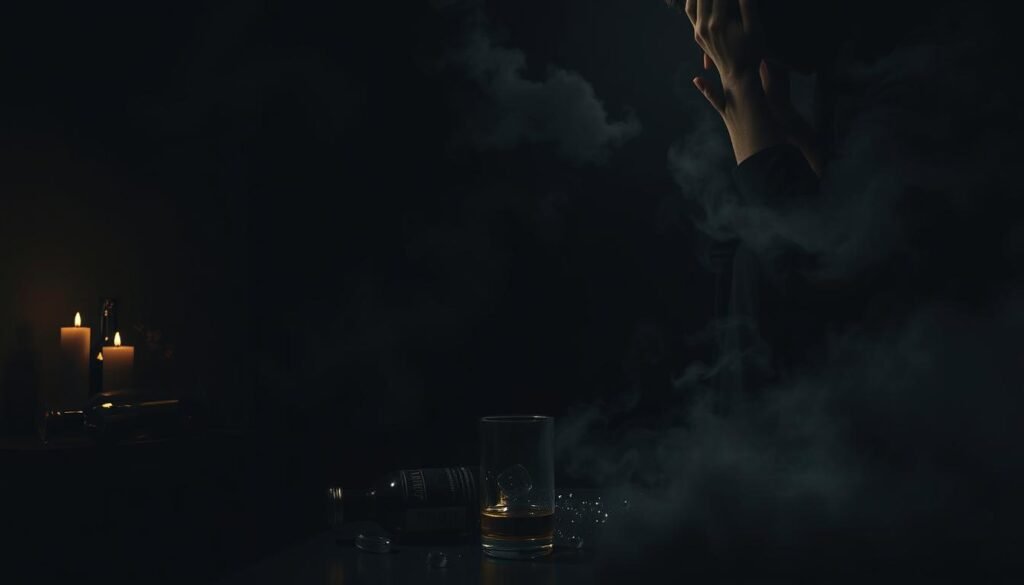About 20 percent of people with social anxiety also have alcohol dependence. This statistic shows the strong link between the two. In the U.S., around 7 percent of adults face social anxiety. This fact highlights the need for better mental health resources.
It’s important to understand how anxiety and alcohol are connected. Alcohol can make anxiety symptoms worse. This creates a loop where some use alcohol to calm anxiety, but end up feeling more anxious. Addressing both alcoholism and anxiety is vital for recovery.
To treat both issues properly, their mutual impact must be acknowledged. Getting help from professionals increases recovery success.
Learn more about the connection for more insights on this topic.
Key Takeaways
- About 20 percent of individuals with social anxiety disorder struggle with alcohol dependence.
- Long-term alcohol use can lead to a worsening of anxiety symptoms.
- Effective recovery from alcoholism must include management of anxiety disorders.
- Alcohol can disrupt sleep patterns, exacerbating anxiety levels the next day.
- Seeking mental health resources can provide strategies for dealing with both anxiety and alcohol use.
Introduction to Anxiety and Alcohol
Many people find themselves in a tricky situation with anxiety and alcohol. They might drink to feel less anxious. But this often leads to more problems, like depending on alcohol too much.
There’s a clear link between feeling anxious and drinking too much. Many folks with anxiety also struggle with alcohol. Knowing this is key for helping them in the best way. This dual diagnosis treatment tackles both problems at once.
At first, drinking might make you feel happier and more relaxed. But these good feelings don’t last. Soon, you might feel even more anxious or panicked after drinking. This is often called “hangxiety.” It’s a cycle of drinking to feel better, then feeling worse.
If you know what to look for, managing anxiety gets easier. Anxiety signs include feeling restless or worried. And if you’re drinking too much, it’s tougher to handle. Trying healthier ways to cope, like relaxing or reaching out to loved ones, is much better.
Understanding the link between anxiety and drinking is crucial. It helps people find the right help. Treatments work best when they focus on both mental health and alcohol issues together.
As more people face both anxiety and issues with drinking, we must look at the whole picture. This ensures everyone gets the support and understanding they need.
Understanding Anxiety
Anxiety is more than just feeling worried or scared. It can turn daily life into a real struggle. Around 3.1% of people in the U.S. deal with generalized anxiety disorder. Knowing the signs of anxiety is key to handle it and get better.
Anxiety doesn’t just affect your mind; it shows in your body too. Symptoms can include a faster heartbeat, sweating, and stomach issues. Some people feel restless or on edge, especially if they mix anxiety medicine with alcohol. Alcohol can make the medicine less effective and increase anxiety.
Several factors can make anxiety worse. These include stress, family history, or bad food and drink habits, like drinking too much alcohol. Between 7% to 10% of people might react badly to alcohol, feeling anxious or having skin flushes. This is more common in 35% of individuals with Asian heritage.
Turning to alcohol to deal with anxiety can backfire. It often leads to a harmful cycle of needing more alcohol as anxiety grows. Anxiety can get worse from the dehydration caused by alcohol or from not sleeping well. Cutting back on alcohol can help lower anxiety and improve your mental health.
There are many resources to help with anxiety besides alcohol. Therapy and support groups can make a big difference. Getting active, meditating, or even writing in a journal are healthy ways to cope with stress and anxiety. By understanding anxiety better, people can start working on feeling better.
Common Types of Anxiety Disorders
Anxiety disorders are a major health issue, touching lives across the United States. They include conditions like generalized anxiety disorder (GAD), social anxiety disorder, panic disorder, and specific phobias. Each one brings its own anxiety symptoms that mess with day-to-day living.
About 2.9% of adults and 0.9% of teens face Generalized Anxiety Disorder. Those with GAD worry a lot about daily stuff, leading to ongoing stress. Social Anxiety Disorder affects around 7% of people. It involves extreme fear of social settings, making them avoid and isolate themselves.
Between 2% and 3% deal with Panic Disorder, facing sudden panic attacks and the constant worry of having more. Agoraphobia hits 1-1.7% of young people and adults worldwide. It can get so bad that leaving home feels impossible.
Specific Phobias affect 8% to 12% of folks in the U.S., making them extremely scared of certain things or activities, like flying or public speaking. Separation Anxiety Disorder strikes 4% of kids, sticking with some into adulthood and hurting their social life. Selective Mutism, impacting 0.03% to 1.9%, can cause issues in school and socially if not addressed.
Women often get anxiety conditions more than men, with things like panic disorder usually starting between 20-24 years old. Many don’t seek help because they don’t know about the mental health supports out there.
| Anxiety Disorder | Prevalence in the US | Main Symptoms |
|---|---|---|
| Generalized Anxiety Disorder | 0.9% adolescents, 2.9% adults | Excessive worrying, restlessness |
| Social Anxiety Disorder | Approx. 7% | Fear of social situations, avoidance |
| Panic Disorder | 2% to 3% | Panic attacks, fear of future attacks |
| Agoraphobia | 1-1.7% | Fear of situations where escape may be difficult |
| Specific Phobias | 8% to 12% | Intense fear of specific objects/situations |
| Separation Anxiety Disorder | 4% children, 1.6% adolescents | Excessive fear of separation from attachment figures |
| Selective Mutism | 0.03% to 1.9% | Inability to speak in certain social situations |
How Alcohol Affects Mental Health
Alcohol can deeply affect your mental well-being. It acts as a depressant and a short-term relaxant. At first, people may feel less anxious and think alcohol helps them cope. But, drinking too much can lead to more anxiety later on. This makes some people depend on alcohol to manage their anxiety.
About 20% to 40% of people being treated for anxiety also battle with alcohol use disorder (AUD). This includes people with generalized anxiety disorder and social anxiety disorder. Those with generalized anxiety disorder might find that alcohol makes their worry and sleep problems worse. And people with social anxiety disorder might drink to feel less nervous at social events, but it doesn’t really help in the end.
Panic disorder is another issue that comes with anxiety and often leads to alcohol abuse. This disorder causes panic attacks and a fear of situations that might trigger another attack. As a result, some people turn to alcohol, tying these conditions closely together. Nearly a third of mental health issues are connected to drinking too much.
Drinking alcohol for a long time can also harm your brain and mood, even raising the chance of suicide. If you have mood swings, like in bipolar disorder, you’re more likely to have problems with alcohol. In fact, around 42% of people with mood disorders also struggle with AUD. It’s important to treat both the mental health issue and the alcohol problem together.

Hangxiety: The Connection Between Alcohol and Anxiety
Hangxiety refers to the anxiety that follows heavy drinking. It affects many people. Those with anxiety disorders are more likely to suffer from hangxiety after drinking too much. This makes alcohol a bigger threat to their mental health.
After drinking too much, one may feel strong hangover symptoms, including anxiety. These symptoms usually peak the day after and can last over 24 hours. The more one drinks, the worse the anxiety can be. To avoid this anxiety, it’s best to not drink more than four drinks in a day and keep it under ten weekly.
Drugs like MDMA or cocaine can make hangxiety worse when mixed with alcohol. Alcohol changes the brain’s neurotransmitters, causing depressive feelings when its effects fade. This change is mainly in how it increases GABA release during drinking.
Young adults and women often report more hangxiety. Studies show 12% to 22% of people feel bad after drinking. Around 75% of those with social anxiety or panic disorders are at high risk. This can lead to serious problems like alcohol use disorder if one keeps drinking a lot.
To deal with hangxiety, it’s important to drink mindfully. To manage the symptoms, rest, stay hydrated, eat healthily, and find relaxing activities. If alcohol or anxiety is a problem, many support services and counseling can help.
Factors Contributing to Anxiety and Alcohol Co-occurrence
The relationship between anxiety and alcohol is complex. Research shows up to 50% of people treated for Alcohol Use Disorder (AUD) also have an anxiety disorder. This highlights the need for treatment that focuses on both issues.

A 2022 study suggests a two-way link between anxiety and AUD. People with AUD are more likely to get anxiety disorders. At the same time, those with severe anxiety might start drinking too much. A 2019 study found that generalized anxiety and social anxiety are closely linked to AUD.
Statistics show a worrying trend. About 20% of those with an anxiety disorder also struggle with alcohol. The Alcoholics Anonymous 2022 Survey found 23% of its members were sober for less than a year. This shows the early recovery period is tough for many.
Alcohol misuse worsens existing anxiety disorders and may cause new mental health issues. People with a past of AUD have up to a 20% higher chance of getting an anxiety disorder. Social anxiety disorder is the most common among them, affecting up to 20%.
Unmanaged anxiety can cause setbacks for those recovering from AUD. However, a 2017 study review of 63 studies found cutting down on alcohol can improve anxiety and depression. This underlines the importance of effective treatments.
Anxiety Symptoms and Their Relationship with Alcohol Use
People often drink to ease anxiety symptoms like panic attacks. They hope alcohol will help them cope with unease. But this habit can increase the reliance on alcohol, leading to addiction. In fact, up to 50% of those treated for alcohol problems also have an anxiety disorder. This shows a deeply troubling cycle between anxiety and alcohol use.
In the U.S., about 11% of people had an anxiety disorder last year. Those with anxiety are more than twice as likely to become alcohol-dependent. The risk of alcohol abuse is about the same for those with or without anxiety. However, anxiety clearly affects how people consume alcohol.
Alcohol provides short-term relaxation but can lead to more drinking. This can make anxiety symptoms worse. Heavy drinking also affects sleep and lowers the brain’s GABA levels, increasing anxiety. Anxiety can even get worse during alcohol withdrawal due to brain chemistry changes.
It’s important to understand how anxiety and alcohol are linked. Cutting down on alcohol can improve anxiety and mental health. People with anxiety should watch how much they drink, as too much can worsen their condition. Recognizing this connection helps develop better coping strategies, offering hope for those affected.
Alcoholism Recovery and Anxiety Management
Anxiety disorders and alcoholism together make recovery hard. About 40 million adults in the U.S. fight with anxiety. Many of them use alcohol to deal with it. This can start a dependence on alcohol, making recovery harder.
To truly overcome alcoholism, managing anxiety is key. Techniques like cognitive behavioral therapy (CBT) are helpful. They teach people to swap bad thoughts for good ones. Adding these methods to alcoholism treatment improves recovery.
Mindfulness like meditation and yoga also lowers anxiety. These activities help with stress and teach better ways to cope. For long-lasting sobriety, one should:
- Seek support from peer groups or counselors
- Engage in creative activities for mental health
- Change their diet to boost well-being
- Exercise regularly
Access to mental health services is critical for those dealing with alcohol and anxiety. Treatment should tackle both issues together. Recovering alcoholics need to watch for signs of falling back into bad habits, like drinking alone or needing alcohol to get through the day.
Combating alcoholism with anxiety requires consistent effort. Success needs the right mental health support. This dual approach is crucial for a sober and healthier life.
Coping Mechanisms for Anxiety Related to Alcohol Use
Many people use coping mechanisms to deal with anxiety from alcohol use. Knowing how anxiety and drinking are linked can lead to better choices. Mindfulness, deep breathing exercises, and being active can lower stress and anxiety.
Social events often push us to drink too much to relax. But, this can make mental health problems worse. It’s key to find mental health help that teaches better ways to cope. Having strong support from others helps keep anxiety management in check. Turning to family and friends for support makes it less likely to use alcohol for coping.
Doing things like yoga or exercise helps with stress and brings people together. Also, looking into therapy helps us see why we turn to alcohol and feel anxious. Understanding past trauma or stress helps pave the way for lasting change. Counseling gives us the tools we need to stop using alcohol for dealing with problems.
In summary, using alcohol to cope might seem good at first, but it has bad outcomes. Choosing healthier ways can greatly better mental health and happiness. With the right coping methods and mental health support, people can handle their anxiety without alcohol.
For those who want to know more about how coping and drinking are connected, look into studies on this topic. You can find in-depth information in this research article.
Holistic Approaches to Managing Anxiety and Alcohol
A holistic approach to anxiety focuses on treating the whole person. It looks at both the mind and body for well-being. Effective strategies are vital for managing anxiety and helping with alcohol recovery.

Adding yoga, meditation, and good nutrition into your life can improve mental health. It also helps with recovering from alcohol use. Each plays a unique part in reducing anxiety and forming a strong management plan.
- Yoga: This combines physical movements, breathing, and meditation to help you relax and lower stress.
- Meditation: Regular meditation builds emotional strength and lowers anxiety, bringing calmness.
- Nutritional Interventions: Eating well-balanced meals supports brain health and improves mood, aiding in anxiety management.
- Acupuncture: This ancient technique reduces both physical and emotional discomfort, effectively lessening anxiety signs.
Regular exercise is also key to managing anxiety. Activities like walking or swimming release happy hormones, lifting your spirits. Studies have found that active people have a lower chance of suffering from anxiety over time.
| Method | Benefits |
|---|---|
| Yoga | Promotes relaxation, boosts physical strength, and cuts down stress. |
| Meditation | Builds emotional resilience and reduces feelings of distress. |
| Nutritional Interventions | Keeps moods stable and boosts brain health. |
| Acupuncture | Effectively tackles physical and emotional stress. |
Practicing mindfulness through deep breathing exercises can further help with anxiety. They let you become more aware of your thoughts and feelings. This way, you can act thoughtfully instead of reacting on impulse.
As people work on overcoming alcohol dependence, exploring ways to manage anxiety is crucial. Taking a holistic approach to anxiety helps them not only recover from alcohol but also leads to a more balanced, fulfilling life.
Dual Diagnosis Treatment: A Comprehensive Approach
People wrestling with anxiety and alcohol use face a tough recovery road. Dual diagnosis treatment is key for them. It combines care that tackles both mental health and substance use. About half of those with severe mental issues also struggle with substance abuse. Integrated treatment is crucial for them.
Research shows 33% to 43% of those in addiction treatment also have anxiety disorders. This calls for specific treatment plans. Methods like psychotherapy and medication can significantly help those with anxiety and alcohol issues.
About half of people with substance issues have a dual diagnosis. This shows the huge need for wide-ranging care. People with dual diagnosis often relapse and face worse outcomes than those with one disorder.
| Condition | Statistics |
|---|---|
| Anxiety Disorder with Substance Use | 15% of people with anxiety have a substance use disorder |
| Dual Diagnosis (co-occurring disorders) | Approximately 50% of those with substance use disorders |
| Hospital Admissions | Disproportionate rates among individuals with dual diagnoses |
| Relapse Rates | Higher for those with both anxiety and alcohol use disorders |
| Integrated Treatment Outcomes | Enhanced likelihood of positive recovery |
Dual diagnosis treatment is essential for healthcare providers to understand. It looks at the link between anxiety and alcohol problems. Addressing both issues together can lead to better recovery. It helps people get back their lives and health.
Conclusion
The link between anxiety and alcohol is complex. Studies show they often happen together and affect each other a lot. People with anxiety might drink to feel better, but this makes anxiety worse later. It’s important to understand this to find treatments that help with both problems.
Treating both anxiety and alcohol issues is key to getting better. Treatment helps with anxiety and the alcohol problem too. If you’re worried about anxiety and alcohol, seek help. There are many places to get support. Taking action is the first step to a healthier life without anxiety and drinking problems.
Recovery looks different for everyone, but knowing how anxiety and alcohol are connected is crucial. Getting help and having a strong support network are important. They help people take back control of their lives and improve their mental health.